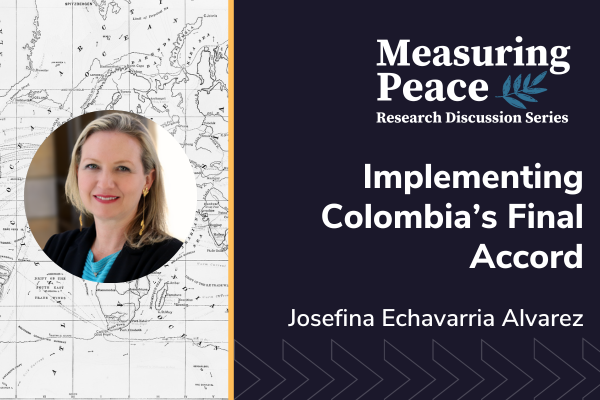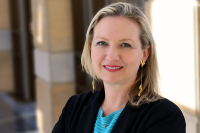
This program is co-sponsored by the Mershon Center for International Security Studies, Pontificia Universidad Javeriana, Corrymeela Community, Northern Ireland Executive, Ulster University, and University of Bradford
The Colombian government and the FARC-EP signed a landmark peace agreement (Final Accord) in 2016. With a comprehensive and multi-dimensional agenda, it established a way out of the war and provided a plan to tackle the roots of historical cycles of violence and build a lasting peace. The Kroc Institute for International Peace Studies’ Barometer Initiative serves as the official monitor for the Final Accord’s implementation. This is the first time a university-based research center has played such a direct role in supporting the implementation of a peace agreement, and it is the first time researchers are measuring the implementation of a peace accord in real time.
This presentation and discussion will offer a conceptual framework for how peace accords are part of larger peacebuilding efforts, and how they relate to social transformation. It will overview the Kroc Institute’s Peace Accords Matrix, its various research methodologies, and the unique ways the database is being used to support the Barometer Initiative in Colombia. Finally, the relationship between measuring peace and peace accord implementation will be explored.
Speakers

Dr. Josefina Echavarría Alvarez is Professor of the Practice and the director of the Peace Accords Matrix (PAM) program at the Kroc Institute for International Peace Studies, part of the Keough School of Global Affairs. Josefina is also a faculty fellow of the Pulte Institute for Global Development and serves as a faculty advisor for the Afghanistan Program for Peace and Development program at the University of Notre Dame.
As the director of PAM, she leads the Barometer Initiative in Colombia, which carries out official monitoring of implementation of the 2016 Final Agreement between the government and the former FARC-EP. Josefina also directs the Legacy Project for “Preserving and Engaging the Digital Archive of the Colombian Truth Commission", which guarantees continued access to more than 200,000 files including audiovisual, non-textual knowledge and digitized documents compiled by the Colombian Truth Commission about the country’s 52-year armed conflict to advance transitional justice, human rights and the centrality of victims.
Josefina earned her Ph.D. in Peace, Conflict, and Democracy from the Jaume I University (Spain), an M.A. in Peace, Development, Security and International Conflict Transformation from the University of Innsbruck (Austria), and a B.A. in Government and International Relations from the University Externado (Colombia).
About Measuring Peace
Is peace measurable? This presentation series brings together researchers, practitioners, and policy specialists across disciplinary backgrounds to explore the diverse and myriad ways in which peace is defined and studied.
Working from an internationally recognized Peace Studies paradigm rooted in the social sciences, Measuring Peace is premised on the belief that durable peace requires more than the absence of active conflict and violence. Rather, an enduring “positive peace” must be collaboratively cultivated through multi-level interventions on local, national, and global scales. Peace-building processes are therefore complex, non-linear, and highly fluid, and require comprehensive social, political, economic, and structural strategies.
Featured speakers in this series will present innovative approaches to the study and practice of peace around the world— and how scholarly research and analysis can help to shape effective policy and intervention strategies on the ground. Topics covered during the 2023-2024 series will include identifying micro-dynamic and everyday indicators of peace, tracking peace accord implementation, tackling paramilitarism, and promoting social healing.
Graduate students who attend at least 2 webinars and the all-day Everyday Peace Indicator workshop (https://www.everydaypeaceindicators.org/) with Dr. Roger MacGinty in March 2024 will receive a Mershon Certificate in Measuring Peace.
Guiding Questions for this Series:
- What does it mean to assess peace? What kinds of working definitions and analytical metrics can we set to make “peace” a discrete and measurable research subject?
- Which kinds of inter/disciplinary research methodologies are most generative for doing peace research? What are the benefits and limitations of different models?
- How can we productively speak to and across historically- and geographically-specific cases of violent conflict in order to make broader claims about what it means to achieve peace?
